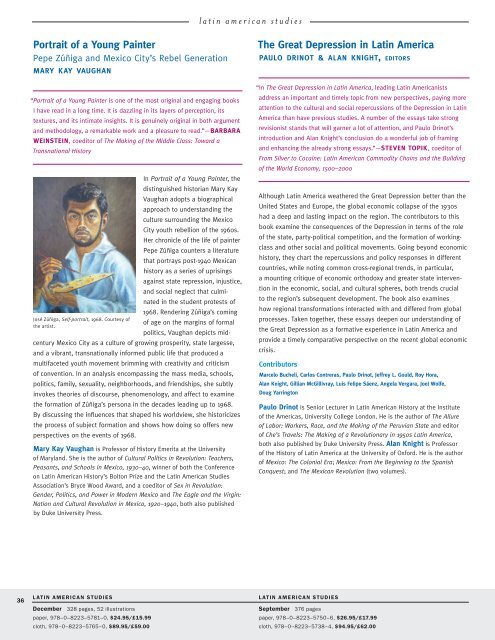x1vuD
x1vuD
x1vuD
Create successful ePaper yourself
Turn your PDF publications into a flip-book with our unique Google optimized e-Paper software.
latin american studies<br />
Portrait of a Young Painter<br />
Pepe Zúñiga and Mexico City’s Rebel Generation<br />
mary kay vaughan<br />
“Portrait of a Young Painter is one of the most original and engaging books<br />
I have read in a long time. It is dazzling in its layers of perception, its<br />
textures, and its intimate insights. It is genuinely original in both argument<br />
and methodology, a remarkable work and a pleasure to read.”—BARBARA<br />
WEINSTEIN, coeditor of The Making of the Middle Class: Toward a<br />
Transnational History<br />
In Portrait of a Young Painter, the<br />
distinguished historian Mary Kay<br />
Vaughan adopts a biographical<br />
approach to understanding the<br />
culture surrounding the Mexico<br />
City youth rebellion of the 1960s.<br />
Her chronicle of the life of painter<br />
Pepe Zúñiga counters a literature<br />
that portrays post-1940 Mexican<br />
history as a series of uprisings<br />
against state repression, injustice,<br />
and social neglect that culminated<br />
in the student protests of<br />
1968. Rendering Zúñiga’s coming<br />
José Zúñiga, Self-portrait, 1968. Courtesy of<br />
of age on the margins of formal<br />
the artist.<br />
politics, Vaughan depicts midcentury<br />
Mexico City as a culture of growing prosperity, state largesse,<br />
and a vibrant, transnationally informed public life that produced a<br />
multifaceted youth movement brimming with creativity and criticism<br />
of convention. In an analysis encompassing the mass media, schools,<br />
politics, family, sexuality, neighborhoods, and friendships, she subtly<br />
invokes theories of discourse, phenomenology, and affect to examine<br />
the formation of Zúñiga’s persona in the decades leading up to 1968.<br />
By discussing the influences that shaped his worldview, she historicizes<br />
the process of subject formation and shows how doing so offers new<br />
perspectives on the events of 1968.<br />
Mary Kay Vaughan is Professor of History Emerita at the University<br />
of Maryland. She is the author of Cultural Politics in Revolution: Teachers,<br />
Peasants, and Schools in Mexico, 1930–40, winner of both the Conference<br />
on Latin American History’s Bolton Prize and the Latin American Studies<br />
Association’s Bryce Wood Award, and a coeditor of Sex in Revolution:<br />
Gender, Politics, and Power in Modern Mexico and The Eagle and the Virgin:<br />
Nation and Cultural Revolution in Mexico, 1920–1940, both also published<br />
by Duke University Press.<br />
The Great Depression in Latin America<br />
paulo drinot & alan knight, editors<br />
“In The Great Depression in Latin America, leading Latin Americanists<br />
address an important and timely topic from new perspectives, paying more<br />
attention to the cultural and social repercussions of the Depression in Latin<br />
America than have previous studies. A number of the essays take strong<br />
revisionist stands that will garner a lot of attention, and Paulo Drinot’s<br />
introduction and Alan Knight’s conclusion do a wonderful job of framing<br />
and enhancing the already strong essays.”—STEVEN TOPIK, coeditor of<br />
From Silver to Cocaine: Latin American Commodity Chains and the Building<br />
of the World Economy, 1500–2000<br />
Although Latin America weathered the Great Depression better than the<br />
United States and Europe, the global economic collapse of the 1930s<br />
had a deep and lasting impact on the region. The contributors to this<br />
book examine the consequences of the Depression in terms of the role<br />
of the state, party-political competition, and the formation of workingclass<br />
and other social and political movements. Going beyond economic<br />
history, they chart the repercussions and policy responses in different<br />
countries, while noting common cross-regional trends, in particular,<br />
a mounting critique of economic orthodoxy and greater state intervention<br />
in the economic, social, and cultural spheres, both trends crucial<br />
to the region’s subsequent development. The book also examines<br />
how regional transformations interacted with and differed from global<br />
processes. Taken together, these essays deepen our understanding of<br />
the Great Depression as a formative experience in Latin America and<br />
provide a timely comparative perspective on the recent global economic<br />
crisis.<br />
Contributors<br />
Marcelo Bucheli, Carlos Contreras, Paulo Drinot, Jeffrey L. Gould, Roy Hora,<br />
Alan Knight, Gillian McGillivray, Luis Felipe Sáenz, Angela Vergara, Joel Wolfe,<br />
Doug Yarrington<br />
Paulo Drinot is Senior Lecturer in Latin American History at the Institute<br />
of the Americas, University College London. He is the author of The Allure<br />
of Labor: Workers, Race, and the Making of the Peruvian State and editor<br />
of Che’s Travels: The Making of a Revolutionary in 1950s Latin America,<br />
both also published by Duke University Press. Alan Knight is Professor<br />
of the History of Latin America at the University of Oxford. He is the author<br />
of Mexico: The Colonial Era; Mexico: From the Beginning to the Spanish<br />
Conquest; and The Mexican Revolution (two volumes).<br />
36<br />
LATIN AMERICAN STUDIES<br />
December 328 pages, 52 illustrations<br />
paper, 978–0–8223–5781–0, $24.95/£15.99<br />
cloth, 978–0–8223–5765–0, $89.95/£59.00<br />
LATIN AMERICAN STUDIES<br />
September 376 pages<br />
paper, 978–0–8223–5750–6, $26.95/£17.99<br />
cloth, 978–0–8223–5738–4, $94.95/£62.00


